|
Read about
more faculty achievements in
Faculty News.
Read about Francoise Marvel’s book and app.
BELOVED BENEFACTOR DOZIER DIES
Laurie Dozier Jr.,
a longtime Tallahassee cardiologist who was one of the College of Medicine’s
most generous friends, died March 6 surrounded by his family. Three days
later, that huge family joined a grateful community in the medical school’s
auditorium to say goodbye to the beloved philanthropist and medical leader.
Dr. Dozier was 85.
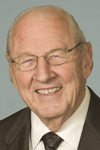
The College of Medicine is particularly grateful that in 2007 Dr. Dozier
gave a planned gift of $2 million to be equally divided between Tallahassee
Memorial and the medical school, which established the Laurie L. Dozier Jr.,
M.D. Professorship. At the time, his daughter Sarah Dozier Sherraden
was director of the college’s Clinical Learning Center. She said that,
although her father was concerned that the practice of clinical medicine was
becoming a lost art, he was impressed by the College of Medicine’s emphasis
on turning out good clinicians, and he wanted to see that continue.
“Dr. Dozier was an incredible pillar of this medical community,” Dean
John Fogarty said. “We are pleased and proud that, through
his generosity to the College of Medicine, his legacy and memory will live
on here through the professorship in internal medicine that he established
to support teaching our next generation of future physicians their clinical
skills.”
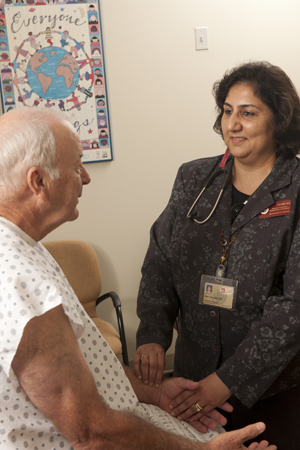
SUCHAK NAMED TOP U.S. GERIATRICIAN
The College of
Medicine, one of the nation’s leading educators in geriatric medicine, now
also has the nation’s top geriatrician of 2012. Niharika Suchak,
M.D., an associate professor in the Department of Geriatrics, has been named
Clinician of the Year by the American Geriatrics Society. She will receive
the award in May at the group’s annual scientific meeting.
“I cannot
imagine another clinician more deserving of this award than Dr. Suchak,”
said Barbara Resnick, president of the AGS. “She has an innate ability to
guide patients and their families through the maze of complex medical
decision-making and considers the patient’s individual needs, which is
essential when caring for older adults.”
Read more about Dr.
Suchak.
COHEN INAUGURATES HUMANISM
LECTURES
A pre-eminent voice in academic medicine offered a
glimpse into the future of U.S. health care – and praise for the College of
Medicine – in a special Grand Rounds on March 22. Jordan Cohen,
M.D., former president of the Association of American Medical Colleges and
current chairman of the Arnold P. Gold Foundation, spoke on the role of
humanism in the reform of health care.
“Humanism,” he said,
“provides the passion needed to sustain one’s commitment to
professionalism.” Whereas professionalism is a way of acting, Cohen
described humanism as a way of being. The humanistic physician demonstrates
attributes such as integrity, compassion and respect.
“Professionalism
and humanism are intimately connected in the virtuous physician,” he said.
But in the absence of humanism, he worries that professionalism can depend
too much on good intentions.
Read more about this lecture.
IF YOU MISSED THESE SPEAKERS...
In the weekly
Grand Rounds and assorted other lectures, the College of Medicine presents
engaging speakers with provocative ideas. Besides Jordan Cohen, recent
speakers have included Julie Jacobson, M.D., former TMH
resident, now a medical dynamo for the Bill & Melinda Gates Foundation, on
trying to tame the world’s neglected tropical diseases; and Professor
Pradeep Bhide and the members of the Erwin Jackson family,
telling the real-world story of the Jacksons’ battle with a movement
disorder that Bhide studies in the new Center for Brain Repair.
This is
where you can see these videos and others created at the College of
Medicine.
If you saw Julie Jacobson’s video on how 50
cents can benefit the health of people around the world, here’s
a link that
you might find helpful.
GRANT HELPS
TSILIMINGRAS STUDY PATIENT SAFETY
Medical errors during hospital
stays make headlines, but far more common are problems that occur after
patients go home.
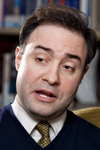 Little
research has focused on the critical weeks after discharge, and none has
focused on rural patients – until now. Dennis Tsilimingras,
M.D., MPH, assistant professor at the Florida State University College of
Medicine, has been awarded a two-year, $908,000 grant from the federal
Agency for Healthcare Research and Quality. With the participation of the
Tallahassee Memorial Hospitalist Group, this study has begun to monitor
approximately 600 patients – half of them rural – for three weeks right
after they’re discharged. Little
research has focused on the critical weeks after discharge, and none has
focused on rural patients – until now. Dennis Tsilimingras,
M.D., MPH, assistant professor at the Florida State University College of
Medicine, has been awarded a two-year, $908,000 grant from the federal
Agency for Healthcare Research and Quality. With the participation of the
Tallahassee Memorial Hospitalist Group, this study has begun to monitor
approximately 600 patients – half of them rural – for three weeks right
after they’re discharged.
Ultimately the goal is to recommend ways to
reduce post-discharge problems, which often involve medications, said
Tsilimingras, director of the medical school’s Center on Patient Safety.
Read the complete press release.
DIRECTORS NAMED FOR RESIDENCY PROGRAMS
The two newest
residency programs affiliated with the College of Medicine have chosen
directors, and both are joining the medical school full time in May.
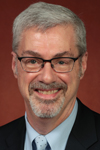 Gregory
Todd, M.D., will direct the Florida State University College of
Medicine and Tallahassee Memorial HealthCare Internal Medicine Residency
Program. He already has been assisting in preparing the new program for
accreditation. His previous position was senior associate director for the
internal medicine residency program at Maimonides Medical Center in
Brooklyn, which includes 96 residents. Pending the decision of the
Accreditation Council for Graduate Medical Education, the program hopes to
admit its first residents as early as July.
Read the Todd press
release. Gregory
Todd, M.D., will direct the Florida State University College of
Medicine and Tallahassee Memorial HealthCare Internal Medicine Residency
Program. He already has been assisting in preparing the new program for
accreditation. His previous position was senior associate director for the
internal medicine residency program at Maimonides Medical Center in
Brooklyn, which includes 96 residents. Pending the decision of the
Accreditation Council for Graduate Medical Education, the program hopes to
admit its first residents as early as July.
Read the Todd press
release.
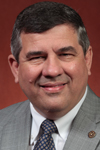 Gary
Goforth, M.D., will direct the Florida State University College of
Medicine and Lee Memorial Health System Family Medicine Residency Program in
Fort Myers. Like Todd, he already has been assisting the program as it
progresses toward receiving approval from the Accreditation Council for
Graduate Medical Education. He’s leaving a position as program director for
a 30-resident, 19-faculty family medicine residency program in Greenwood,
S.C.
Read the Goforth press release. Gary
Goforth, M.D., will direct the Florida State University College of
Medicine and Lee Memorial Health System Family Medicine Residency Program in
Fort Myers. Like Todd, he already has been assisting the program as it
progresses toward receiving approval from the Accreditation Council for
Graduate Medical Education. He’s leaving a position as program director for
a 30-resident, 19-faculty family medicine residency program in Greenwood,
S.C.
Read the Goforth press release.
SPEAKING OF SOUTHWEST FLORIDA...
Elena Reyes, Ph.D., who was associate professor and vice
chair for education in the Department of Medical Humanities and Social
Sciences, has been named the College of Medicine’s first regional director
for Southwest Florida.
The Fort Myers internship is just the latest
example of the medical school’s expanded presence in that part of the state.
Since 2007, the college has also been in partnership with Collier Health
Services to operate a rural and multicultural health education site in
Immokalee. Reyes’ passion for serving the multicultural population there has
produced successful initiatives, including a psychology postdoctoral program
that has brought new clinical psychologists onto the faculty and laid the
groundwork for a possible APA-accredited health psychology program in
partnership with Collier Health.
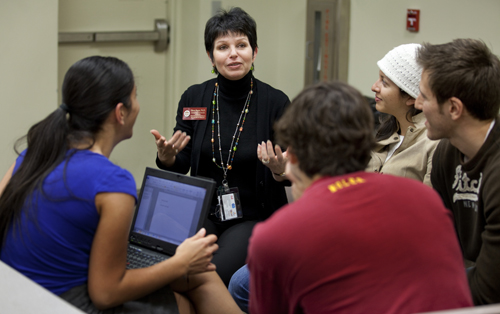
In her new role, Reyes will oversee the Immokalee site and serve as the
college’s Southwest Florida liaison with community agencies and area
leaders. In that capacity, she will report directly to Paul McLeod,
senior associate dean for regional campuses. “As an experienced clinical
psychologist and educator,” Dean John Fogarty said, “Dr.
Reyes also will be instrumental in developing the behavioral medicine
curriculum for the family medicine residency at Lee Memorial.”
Reyes is
probably best-known as the faculty sponsor for, and guiding force behind,
FSUCares. “Although she is not always noticed, she has something to
do with EVERYTHING that involves FSUCares,” said the group’s
current president, second-year student John Thomas. “Over
the years, Dr. Reyes has been the constant factor allowing FSUCares
to have continuity of service within our community and abroad. She also was
a huge motivating factor in my decision to attend the FSU College of
Medicine. Any program would be lucky to have her.” She will assume her new
duties full time effective June 1.
LC NAMED FOR THE HURTS
Suite 3180 was packed for the unveiling of its new name: the Julian
and Myra Hurt Bridge to Clinical Medicine Learning Community.
Senior Associate Dean Myra Hurt was one of the creators of the Bridge
program, designed to expand the pool of successful medical students. The
plaque is a public “Thank you” to her and her husband, Julian, for creating
an endowment for Bridge scholarships. It is the first of the medical
school’s nine learning communities to be named.
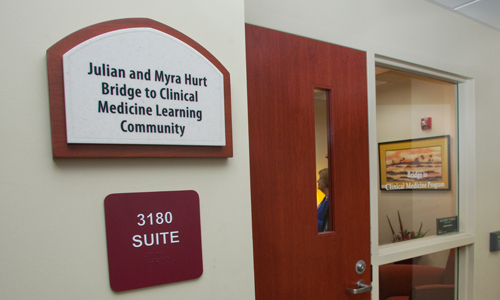
“I can’t imagine anything more apropos than to have your name on the Bridge
suite,” Dean John Fogarty told the Hurts, “and for you to
leave for posterity a gift to our Bridge students. Thank you for being
examples to this community.”
The Bridge to Clinical Medicine master’s
program is a pipeline into medical school for applicants from medically
underserved, rural and inner-city communities, with the expectation that
many eventually will provide medical care to those communities. More than
100 students have entered medical school through Bridge. “If it were not for
this program, many of us would not have the opportunity to serve as
physicians,” Bridge graduate Angela Green told the Hurts
earlier. “Because you have invested in us, you are impacting communities.
And we are extremely grateful.”
UF NAMING CLASSROOM FOR
WATSON
A classroom in the University of Florida’s new medical
education building is being named for Florida State College of Medicine
Executive Associate Dean Robert Watson. It’s not
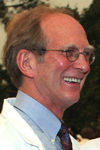 just
any classroom. “I was beyond surprised when I heard about an education room
being named in my honor, a room that will also serve as a permanent home for
the Chapman Humanism Society,” said Watson, a neurologist who taught at the
UF College of Medicine for more than 35 years, including 17 as senior
associate dean for educational affairs. just
any classroom. “I was beyond surprised when I heard about an education room
being named in my honor, a room that will also serve as a permanent home for
the Chapman Humanism Society,” said Watson, a neurologist who taught at the
UF College of Medicine for more than 35 years, including 17 as senior
associate dean for educational affairs.
The Chapman Society is the
UF chapter of the national Gold Humanism Honor Society, which is committed
to “working within and beyond medical education to inspire, nurture and
sustain lifelong advocates and activists for patient-centered medical care.”
Dr. Michael Good, dean of the UF College of Medicine, praised Watson as the
epitome of “integrity, compassionate concern and respect.” That’s also how
he is known at the Florida State College of Medicine, where he joined the
administration in 2008.
SMITH NEW PRESIDENT OF FAFP
George Smith, M.D., a member of the Pensacola Regional
Campus’ Community Board, became president of the Florida Academy of Family
Physicians for 2012 and also president
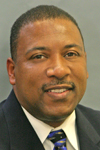 of
the Escambia County Medical Society. He is currently the medical director of
Escambia Community Clinics, where the mission is to provide compassionate
care for patients, regardless of their ability to pay. Under his leadership,
Escambia Community Clinics became a Federally Qualified Health Center four
years ago, growing from one clinic to five and now serving more than 28,000
patients. of
the Escambia County Medical Society. He is currently the medical director of
Escambia Community Clinics, where the mission is to provide compassionate
care for patients, regardless of their ability to pay. Under his leadership,
Escambia Community Clinics became a Federally Qualified Health Center four
years ago, growing from one clinic to five and now serving more than 28,000
patients.
“That clinic is
the cornerstone for indigent care in the community,” said Dr. Dennis
Mayeaux, M.D., chair of the FAFP Board and clerkship director in
family medicine for the College of Medicine’s Pensacola campus. “As
individuals have lost their jobs and subsequently their insurance, [Dr.
Smith has] had to serve an increasing number of people. With his
ground-level experience, he’ll be a compass to guide those at a policy
level.”
Read a more detailed story about Smith.
POSTDOC AWARDED TOP FELLOWSHIP
Rakesh
Singh, a senior postdoctoral fellow in the laboratory of
Akash Gunjan, Ph.D., has been awarded the prestigious Ramanujan
Fellowship by the Department of Science
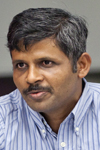 and
Technology of the Government of India. According to Gunjan, assistant
professor in Biomedical Sciences, Singh’s fellowship carries a salary
support equivalent to $1,500 per month and a travel allowance of $10,000 per
year for five years. Singh can use it to supplement his independent research
on the role of ubiquitin ligases in genome stability at any institute or
university in India. and
Technology of the Government of India. According to Gunjan, assistant
professor in Biomedical Sciences, Singh’s fellowship carries a salary
support equivalent to $1,500 per month and a travel allowance of $10,000 per
year for five years. Singh can use it to supplement his independent research
on the role of ubiquitin ligases in genome stability at any institute or
university in India.
“These fellowships are extremely competitive,”
Gunjan said, “and only about 35 are awarded each year. To be considered one
of the top 35 young minds in the area of science and technology among the
current Indian population of 1.2 billion people is indeed a remarkable feat,
and Rakesh deserves our heartiest congratulations!”
FINDING A MATCH (AND POPPING THE QUESTION)
All the usual
excitement – plus a romantic surprise – made the College of Medicine’s Match
Day on March 16 one of the brightest days of the year. It was the day
students in the 117-member Class of 2012 learned where they’ll enter
residency training this summer.
Nearly two-thirds of the fourth-year
students matched in primary care (family medicine, pediatrics, internal
medicine or obstetrics/gynecology). Other students matched in
anesthesiology, emergency medicine, neurology, pediatric neurology,
orthopedic surgery, otolaryngology, pathology, psychiatry, diagnostic
radiology, general surgery and urology.
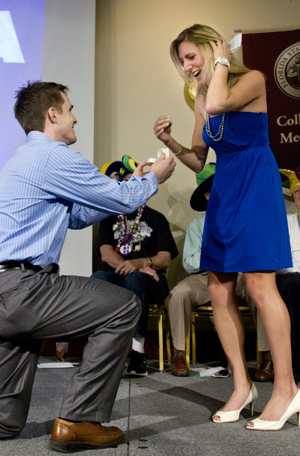 The
residency match, conducted annually by the National Resident Matching
Program, is the primary system that matches applicants to residency programs
with available positions at U.S. teaching hospitals. Graduating medical
students across the country receive their match information at the same time
on the same day. The
residency match, conducted annually by the National Resident Matching
Program, is the primary system that matches applicants to residency programs
with available positions at U.S. teaching hospitals. Graduating medical
students across the country receive their match information at the same time
on the same day.
Here was the romantic surprise: Fourth-year student
Kristina Seeger, from the Daytona Beach Regional Campus,
walked onstage with boyfriend Patrick Mickel to announce her match. After
the applause, she turned to leave the stage – but Mickel had an announcement
of his own. He was happy about the match, he said, but what he wanted most,
wherever they ended up, was to spend all his days with her. Suddenly, thanks
to top-secret coordination with the IT department, a slide popped up on the
big screen reading: “Kristina, will you marry me?” As the audience gasped
and applauded, Mickel dropped to one knee and made his marriage proposal
official. Yes, she said “Yes.”
FSU’s Match Day history. Where
our graduates are practicing.
STATEWIDE
AUTISM WEBSITE DEVELOPED
The College of Medicine's Autism
Institute has developed a statewide website called Autism Florida. It’s
designed to help people access information about autism quickly and find
resources in Florida that can help, from the time they suspect autism
through screening, evaluation, treatment, and into transitional and adult
years.
It links to existing resources, including information from
Florida’s Center for Autism and Related Disabilities (CARD), state agency
websites, the Dan Marino Foundation, and other organizations. The Autism
Institute developed the website at the request of the Governor’s Task Force
on ASD in collaboration with CARD and the Florida Department of Health.
Find additional information.
SPRING IN NICARAGUA (AND PANAMA, AND...)
Once again,
spring break saw dozens of students and faculty members broadening their
horizons and sharpening their skills through service-learning trips to other
places. Nearly 20 returned to Los Cedros, Nicaragua, a village where SIGH
(Students Interested in Global Health) has been making quarterly visits
since December 2010. And two dozen participated in FSUCares’ annual
spring trips to Immokalee, Texas and the village of Filipina, Panama.
These are the names of the participants in SIGH’s Nicaragua trip.
Fourth-year students: John Abraham (Sarasota campus),
Sareh Shoraka Dyer (Orlando), Aaron Hilton
(Fort Pierce), Gina Obmana (Orlando), Anup Patel
(Orlando), Amol Purandare (Pensacola), Aaron Snyder
(Daytona Beach) and Shahab Virani (Daytona Beach).
First-year students: Mitali Agarwal,
Sara Ghayouri, Joshua Gordon,
Brian Hassani and Nathan Nowalk. FSU undergrad
Honors Medical Scholars: Blake Davis and David
Miller. Tallahassee Memorial resident: Kristin Hanson,
M.D. Family Medicine & Rural Health faculty members: Jo Brown,
M.D.; Rob Campbell, M.D.; and Daniel Van Durme,
M.D.
Here are the names of the FSUCares participants.
Immokalee group, students (all first-year): Neeka Akhavan,
Tyler Caton, Paula Domino,
Ryan Howard, Laura Irastorza and
Nicole Miller. Immokalee group, faculty: Elena Reyes,
Ph.D., and Kim Driscoll, Ph.D. (both from Medical
Humanities). Panama group (shown below), students (all first-year unless specified
otherwise): Geami Britt, Juliana
Matthews, Tiana Monostory, Jonathan Salud,
John Thomas (second-year) and Kristen Valencia.
Panama group, faculty/alumni: Ken Brummel-Smith, M.D.,
chair, Department of Geriatrics; Mark Stavros, M.D.,
education/clerkship director, emergency medicine, Pensacola campus; and
UF-Shands residents Charles Ritchie, M.D., ’08, and
Sarah Ritchie, M.D., ’08. Texas-Mexico group, students (all
first-year): Caitlin Borkowski, Maureen (Paulie)
Bruns, David Capelouto and
Brian Gordon. Texas-Mexico group, faculty: Suzanne Harrison,
M.D., and Angel Braña, M.D.
View FSUCares
posters.
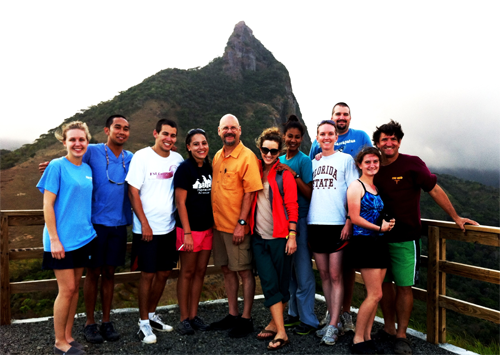
|






 Gregory
Todd, M.D., will direct the Florida State University College of
Medicine and Tallahassee Memorial HealthCare Internal Medicine Residency
Program. He already has been assisting in preparing the new program for
accreditation. His previous position was senior associate director for the
internal medicine residency program at Maimonides Medical Center in
Brooklyn, which includes 96 residents. Pending the decision of the
Accreditation Council for Graduate Medical Education, the program hopes to
admit its first residents as early as July.
Gregory
Todd, M.D., will direct the Florida State University College of
Medicine and Tallahassee Memorial HealthCare Internal Medicine Residency
Program. He already has been assisting in preparing the new program for
accreditation. His previous position was senior associate director for the
internal medicine residency program at Maimonides Medical Center in
Brooklyn, which includes 96 residents. Pending the decision of the
Accreditation Council for Graduate Medical Education, the program hopes to
admit its first residents as early as July.
 Gary
Goforth, M.D., will direct the Florida State University College of
Medicine and Lee Memorial Health System Family Medicine Residency Program in
Fort Myers. Like Todd, he already has been assisting the program as it
progresses toward receiving approval from the Accreditation Council for
Graduate Medical Education. He’s leaving a position as program director for
a 30-resident, 19-faculty family medicine residency program in Greenwood,
S.C.
Gary
Goforth, M.D., will direct the Florida State University College of
Medicine and Lee Memorial Health System Family Medicine Residency Program in
Fort Myers. Like Todd, he already has been assisting the program as it
progresses toward receiving approval from the Accreditation Council for
Graduate Medical Education. He’s leaving a position as program director for
a 30-resident, 19-faculty family medicine residency program in Greenwood,
S.C.

 just
any classroom. “I was beyond surprised when I heard about an education room
being named in my honor, a room that will also serve as a permanent home for
the Chapman Humanism Society,” said Watson, a neurologist who taught at the
UF College of Medicine for more than 35 years, including 17 as senior
associate dean for educational affairs.
just
any classroom. “I was beyond surprised when I heard about an education room
being named in my honor, a room that will also serve as a permanent home for
the Chapman Humanism Society,” said Watson, a neurologist who taught at the
UF College of Medicine for more than 35 years, including 17 as senior
associate dean for educational affairs.  of
the Escambia County Medical Society. He is currently the medical director of
Escambia Community Clinics, where the mission is to provide compassionate
care for patients, regardless of their ability to pay. Under his leadership,
Escambia Community Clinics became a Federally Qualified Health Center four
years ago, growing from one clinic to five and now serving more than 28,000
patients.
of
the Escambia County Medical Society. He is currently the medical director of
Escambia Community Clinics, where the mission is to provide compassionate
care for patients, regardless of their ability to pay. Under his leadership,
Escambia Community Clinics became a Federally Qualified Health Center four
years ago, growing from one clinic to five and now serving more than 28,000
patients. 
